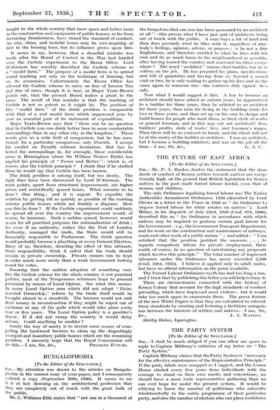BUNGALOPHOBIA
[To the Editor of the SPECTATOR.] SIE,—My attention was drawn to the articles on Bungalo- phobia in the current issue of your paper, and I consequently ordered a copy (September 20th, 1930). It seems to me it is at last dawning on .the architectural profession that they -are completely out of touch with the great bulk of the publie.
Mr. C. Williams-Ellis states that " not one in a thousand of
the bungalows that one sees has been sponsored by an architect at all "—this proves what I have just said of architects being out of touch with the public. A man buys a bit of land and then does precisely what he likes with it, regardless of any- body's feelings, opinion, advice, or prayers ; is he nut a free Englishman, and therefore entitled to what he likes with his own and do as much harm to his neighbourhood as possible, after having toured the country and scattered his litter every- where ? The word " architect " means chief builder, but he is seldom on the job. He has prepared his plans, specifications and bill of quantities and having done so, beyond a casual visit or two, he is only waiting to gather up his fees and do the same again to someone else—the contract duly signed—he's safe.
Now what I would suggest is this. A boy to become an architect should leave school at sixteen years, be apprenticed to a builder for three years, then be articled to an architect for three years, then earn his living in the building trade for two or three years, and then set up on his own to design and build houses for people who want them, as their clerk of works or general foreman, and in this way cut out architects fees, builders' profits, clerk of works' fees, and foremen's wages. Then there will be no contract to break, and the client will not be at the mercy of the builder or architect. I was an architect, but I became a building architect, and was on the job all the


































 Previous page
Previous page